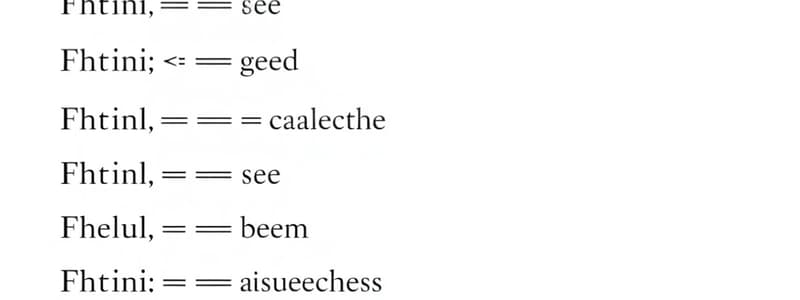Podcast
Questions and Answers
Complete the sentence: "He left early _ avoid heavy traffic."
Complete the sentence: "He left early _ avoid heavy traffic."
- about to
- so as to (correct)
- enough to
- so that
Which of the following sentences uses the infinitive form of the verb correctly?
Which of the following sentences uses the infinitive form of the verb correctly?
- She enjoys reading books.
- She enjoys to reading books.
- She enjoys read books.
- She enjoys to read books. (correct)
Complete the sentence: "On hot days, I usually go to the pool _ ."
Complete the sentence: "On hot days, I usually go to the pool _ ."
- for swim
- to swim (correct)
- swimming
- to swimming
Which sentence is grammatically correct?
Which sentence is grammatically correct?
Complete the sentence: "She grew up _ a famous artist."
Complete the sentence: "She grew up _ a famous artist."
Fill in the blank with the correct form of the verb: "It's difficult __ such a complicated problem."
Fill in the blank with the correct form of the verb: "It's difficult __ such a complicated problem."
Complete the sentence: "We run to the store, _ find it closed."
Complete the sentence: "We run to the store, _ find it closed."
Find infinitive used as subject:
Find infinitive used as subject:
Flashcards
Continuous infinitive
Continuous infinitive
Refers to actions that are ongoing or in progress.
Subject infinitive
Subject infinitive
The infinitives that function as subjects.
Infinitive after adjectives
Infinitive after adjectives
The infinitive that follows an adjective, often describing something
Split infinitive
Split infinitive
Signup and view all the flashcards
Simple infinitive
Simple infinitive
Signup and view all the flashcards
Infinitive after verb
Infinitive after verb
Signup and view all the flashcards
Study Notes
Simple Infinitives
- Simple infinitives use the base form of the verb.
- They are used to express a general action.
- They are often used to maintain the same tense in main and subordinate clauses.
Perfective Infinitive
- It expresses a completed action, referring to actions already or completely finished.
Infinitive Functions
- Infinitives act as nouns, adjectives or adverbs
- They can represent subjects, objects or prepositional complements.
Infinitive Complements of Verbs
- Infinitives can be used to complete verbs (e.g. "He wanted to learn").
Infinitive Phrases with "So as to" and "So that"
- "So as to" and "So that" introduce infinitive phrases. The infinitive shows the purpose of the action described in the main clause.
Infinitive Forms
- Infinitive forms include active, simple, and bare infinitives.
- They may also be continuous, perfect, or perfect continuous, and active or passive.
Correct Infinitive Usage
- Correct infinitive use is crucial for grammatically sound sentences.
- Sentences should be reviewed for proper infinitive form.
- Example: "She enjoys reading books." is correct. "She enjoys to read books" is incorrect.
Infinitive Phrases- Adjectives
- Infinitives can follow adjectives (e.g., "It's easy to learn").
Infinitive Phrases as Subjects
- Infinitive phrases can function as subjects (e.g., "To travel the world is my dream").
Correct Infinitive Use in Sentences
- "I need to get ready." is the correct sentence.
- Avoid incorrect verb forms such as "I need you ready." or "You need ready".
Split Infinitives
- A split infinitive occurs when a word comes between "to" and the verb.
- Example: "I wanted to boldly go..." (incorrect)
- Example: "I wanted to go boldly..." (correct)
Infinitives with Prepositions
- Infinitives can be used with prepositions.
- Example: "On hot days, I usually go to the pool to swim."
Continuous Infinitive
- Used for actions ongoing or in progress.
Correct Infinitive Phrase Use in Sentences
- Example: "I want to study harder." is correct
Infinitives with Adverbs of Purpose
- Complete the sentence by using the infinitive phrase "so as to" ("She grew up to be a famous artist.") or "to" ("She grew up to be a famous artist").
Correct Infinitive Forms
- "To swim" and "To read" are more complete infinitive forms.
Infinitive Complements
- Use the infinitive, "to solve," to complete the verb "It's difficult".
Infinitive Phrases with "Only to"
- "Only to" introduces an unexpected consequence (e.g., "We ran to the store, only to find it closed.").
Infinitive Phrases as Subjects
- Examples: "To travel the world is my dream." and "To read is enjoyable."
Infinitives after Adjectives
- Infinitives can follow adjectives, (e.g., "It's easy to learn a new language.")
Studying That Suits You
Use AI to generate personalized quizzes and flashcards to suit your learning preferences.



